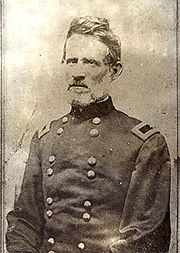Camp Dennison, Indian Hill’s neighboring area, served as a training ground for over 75,000 Union soldiers during the Civil War (1861-1865). One of the post commanders was Brigadier General Jacob Ammen.
 Like many Ohioans of the 1800’s, Ammen was not a native. Born in Virginia in 1806, he moved to Brown County (Levanna, Ohio) as a youth. Legend has it that one of his boyhood acquaintances was Ulysses Grant of Point Pleasant. When Ammen was 19, he was appointed to the Military Academy at West Point, from which he graduated with honors in 1831. He served with the First U.S. Artillery and subsequently had academic duty as a professor of Mathematics and Philosophy. Resigning his commission in 1837, he taught Civil Engineering at various colleges in Kentucky and Indiana.
Like many Ohioans of the 1800’s, Ammen was not a native. Born in Virginia in 1806, he moved to Brown County (Levanna, Ohio) as a youth. Legend has it that one of his boyhood acquaintances was Ulysses Grant of Point Pleasant. When Ammen was 19, he was appointed to the Military Academy at West Point, from which he graduated with honors in 1831. He served with the First U.S. Artillery and subsequently had academic duty as a professor of Mathematics and Philosophy. Resigning his commission in 1837, he taught Civil Engineering at various colleges in Kentucky and Indiana.
When the War Between The States commenced after the surrender of Ft. Sumter, Ammen immediately volunteered, was appointed Captain, and raised a company, the 12th O. V. I. (Ohio Volunteer Infantry). He was transferred to the 24th O. V. I., which he equipped and instructed at the newly established Camp Dennison in the spring of 1861. The fresh recruits constructed their own shelters on the 500 acres of leased farmland, erecting rough pine board barracks on dirt floors. The lumber was delivered, as were most camp provisions, by the Little Miami Railroad. An especially wet spring caused many of the soldiers to complain of swamp-like conditions. Ammen wrote to his wife on May 13, “Yesterday it rained hard, and the camp is mud.” Despite leaking shanties, ankle deep mud, and not enough blankets, Ammen prepared his troops for battle that summer.
They were dispatched to the Western Virginia Campaign in late July. Ammen and his regiment were engaged at the summit of Cheat Mountain and in combat at the Green Briar. After these conflicts, his fellow officers presented him with a sword engraved, “Col. J. Ammen, Cheat Mt., Sept. 12, 1861” Also his men gave him epaulets, a sword knot, sword belt, and sash. To reciprocate this tribute, he instructed his wife to purchase two flags for the regiment at Shillito’s Store. As a commander, Ammen exhibited the talent of a West Pointer. When on duty, he was a stern disciplinarian; disloyalty was met with punishment – “Hang ’em up by the thumbs!” was his saying. Yet while off duty, he was well respected by his men, who called him Uncle Jake.
Following this action in the East, Ammen’s regiment joined the Tennessee and Mississippi Campaign with the Army of the Ohio in Kentucky. Under the command of General Buell, he was present at the Battle of Shiloh, the bloodiest battle of the Civil War. During that two day carnage, Union troops under Grant were almost defeated the first day, but were reinforced by 2,500 fresh troops that evening, including Ammen’s men. The Northerners prevailed the second day, and won the battle. In command of the Tenth Brigade, Ammen was officially praised for his cool, wary, and vigorous fighting methods. After this crucial Union victory, Ammen pursued the Confederates to Corinth and northern Alabama. When his health prevented him from further field service, he was assigned an administrative command in the North.
When the Civil War was over, he moved back to Ohio, becoming the Surveyor and Engineer of Hamilton County. Subsequently he held several offices of public distinction: as a member of the Board of Visitors for inspection of West Point, and a U.S. representative prior to the construction of the Panama Canal. Blind for the last several years of his life, he lived with his son in Lockland, where he died in 1894. Obituaries praised the gallant soldier of the Republic, as he was one of the last known survivors of the war in the area.
Jacob Ammen’s story brings to mind all soldier volunteers who prepared at Camp Dennison. The training facility was utilized by 57 regiments of Ohio infantry, 9 regiments of cavalry, and 19 batteries of artillery. It was one of the largest camps used by the Union Army during the Civil War. Also the Camp housed a 2300 bed hospital, reputedly one of the best in the country. Now more than 150 years later, the sacrifices and accomplishments of those men who drilled there, who ate there, who went to battle from there deserve a tribute.
